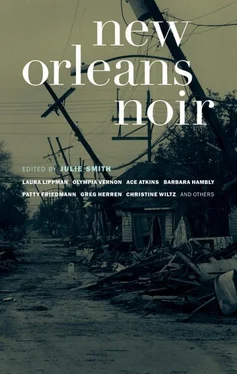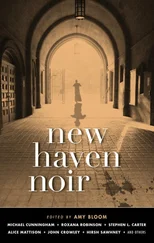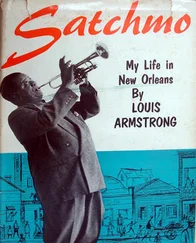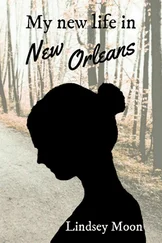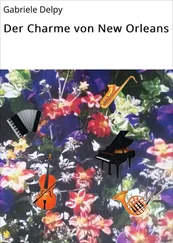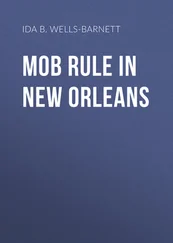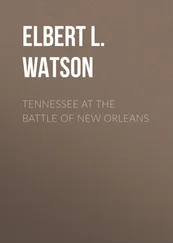“Yeah.”
Boy, it burned Mike up. Some of us sees it, some of us don’t. That kind of arrogance, the guy was probably gouging the money out of people. Riding around in cabs, going to the casino — money to burn.
Mike exited the interstate and drove slowly along West End Boulevard. It looked as though most of the debris had been bulldozed out of the street since he’d last come through here, but if he went too fast he might drive into one of those crater-sized potholes the storm had left all over the city, as if it had blown out the asphalt with its explosive winds, the same way it bombed through houses and tore huge trees whole out of the ground. You could bust a tire if you missed one of those holes in the dark, do some serious damage to your car.
Mr. Sees-it was still looking through the window into a night so dark the skeletons of houses loomed like blackened ghosts. Mike jumped in his seat as a mountainous mass appeared ahead on his left in what had been the half-block-wide green space between West End and Pontchartrain boulevards. Once he was up on it, his headlights revealed a giant mound of debris. The green space, which Mike knew was now black even in the daylight from the toxic water, had become a dumping ground. He’d heard on the radio that the amount of debris already collected in the city was a year’s worth of garbage in Manhattan. The landfills couldn’t take any more.
Mike jumped again; his eyes had drifted from the road and caught the edge of a rift in the concrete. Sees-it said, “You sure you know where you’re going? I can’t see a fucking thing.”
“Yeah, I know where I am. Filmore’s just up there.”
The man faced forward now, sitting up so he could clutch the back of the front seat. His nerves had got him. He was nuts to want to come out here at night. Mike had heard the looters came out after dark. Like cockroaches. They crawled through places most humans wouldn’t go, searching out anything that might turn a dollar. They stripped the plumbing, the light fixtures, the copper flashing, chimney covers, eating a house down to the bare bones. Who knew what kind of opportunity this cockroach in the back of his cab could find at night. Mike should have said no. To hell with the extra buck. He rubbed his hand over his face. Christ — couldn’t he think about anything other than money?
“Here’s Filmore.” He made a right turn and slowed the taxi to the speed of a gimpy pedestrian. “Where to?”
“Uh, General Diaz, General Haig, Argonne. One of those.”
“If you’d told me that to begin with, I could have gone straight to Canal Boulevard.”
“Yeah.”
“It’s your money.”
Roach Man scooted to the edge of the seat, his antennae tuned. “They’re in a service alley behind one of the houses they’re gutting.”
They crossed Canal Boulevard. Mike stopped at the General Diaz alley, but it was a dead end in the dark. The guy mumbled something that sounded like, “Motherfucking spics.”
“What?”
“You think we’d see a lantern in all this pitch black.”
Mike rolled past the intersection of Filmore and Marshal Foch. Just before Argonne, they saw a soft glimmer of light, presumably from a lantern, a quarter-block down the alley.
The guy opened the cab door. “I’ll be fifteen, maybe twenty minutes. If it’s gonna take any longer, I’ll come let you know.” Outside, he stood for a moment to zip up his cheap windbreaker. His new white sneakers shone in the dark. Even with the windows up, Mike could hear the crunch as he walked down the alley, the poisonous wasteland dried to a crisp in the drought since the hurricane.
Mike decided to turn the taxi around so he’d be pointed back toward the interstate. The quicker he could get out of here the better. His lights picked up the sheetrock dust surrounding several houses as he made a wide circle at the intersection. The dust coated Argonne; a lot of house gutting going on back here. He could smell the dust in the air. He didn’t know if it meant people were trying to come back or trying to crowbar the money out of the insurance companies’ tight fists. The latest word was they wouldn’t pay off unless the house was gutted. What people were being put through, like puppets on a string.
Mike parked at the mouth of the alley but left the engine running for the heat. He could make out the top edge of the carport where the light came from; he could see that it leaned sharply, but he didn’t notice anyone or any shadows, only a halo of light illuminating a small area of the alley.
Mike didn’t like the finger of fear running up his spine. He had a bad feeling sitting out here in a dark ghost town with lots of good hiding places. He needed to be alert, to hear the slightest sound in the dark. He cut the engine, cracked his window open enough to hear a different quality of silence than that in the car, and pulled the collar of his jacket up around his neck. Somehow his passenger was up to no good, maybe the whole bunch of them, whoever it was that found cover in the shambles of other people’s houses. Guilt rose in him like bile that he would have a payday, likely a good one, from this opportunist.
The guilt stole into his awareness. If it wasn’t guilt about not making enough money, it was guilt about taking it from the wrong people, guilt about the way he made it. How did the straight-A Jesuit student, the kid with so much promise, end up driving a taxi at night? He rubbed his hand over his face, something he did so often now it was like a tic. The worst thing about driving the taxi, it gave him too much time to think. He wished he had a button on the side of his head he could turn to the OFF position.
Behind him came a sharp crack that sounded like a pistol shot. His body jumped with enough force that he hit his head on the ceiling of the cab. He whipped around. Another crack and the limb of a dying camphor tree fell to the ground inches away from his rear bumper. He slumped into his seat, limp, wasted. As if he could stop his racing heart, he pressed his hand against his chest. He glanced down the empty alley, checked his watch. It had been fifteen minutes. Where was this guy? His heart wouldn’t slow down; his throat was tight. Christ, he thought he was going to die.
Mike was afraid of death. He thought about it a lot and wondered if other people did. No one ever talked about it much, but then neither did he. Stories he’d heard about people dying for a few minutes before being pulled back into life — the white light, the feeling of peace, of someone, God, beckoning from the light-filled tunnel — he wanted to buy it. The nuns at Holy Cross, even the sometimes cynical Jesuits, had assured him there was an afterlife. But Mike feared death would be painful and messy and final. He would die and there would be nothing. When he was a boy, he would look into the sky, stare deeply into the heavens, his mind traveling into an infinity of nothing as long as he could stand it, before panic set in and he returned to earth. He could never keep going to find out if anything might be there to make him believe; his heart would begin to pound unnaturally and he would think he might die.
Had the nuns put this fear of death in him with their talk of eternal damnation? Wasn’t he supposed to have developed a fear of God, not of nothingness? Had the Jesuits used subliminal messages in the religion classes? Had it been the Sunday trips to the cemetery, rain or shine, to visit the dead, his morose grandmother pulling him along by the hand, telling him to keep up? Or could it have been his father’s stories about the war, about watching men die, about saving men whose bodies were already dead from paralyzing wounds?
Mike would go to bed sometimes thinking about how he might die. His father’s talk of heroism, the great terribleness of war, and the glory of it all would swarm in his head. “No guts, no glory,” he liked to say, speaking about it the way Mike later heard men talk about their college football days, as though life beyond could never live up to such thrilling times. He tried to imagine a natural death, in his sleep, but all that did was make him try not to close his eyes.
Читать дальше
